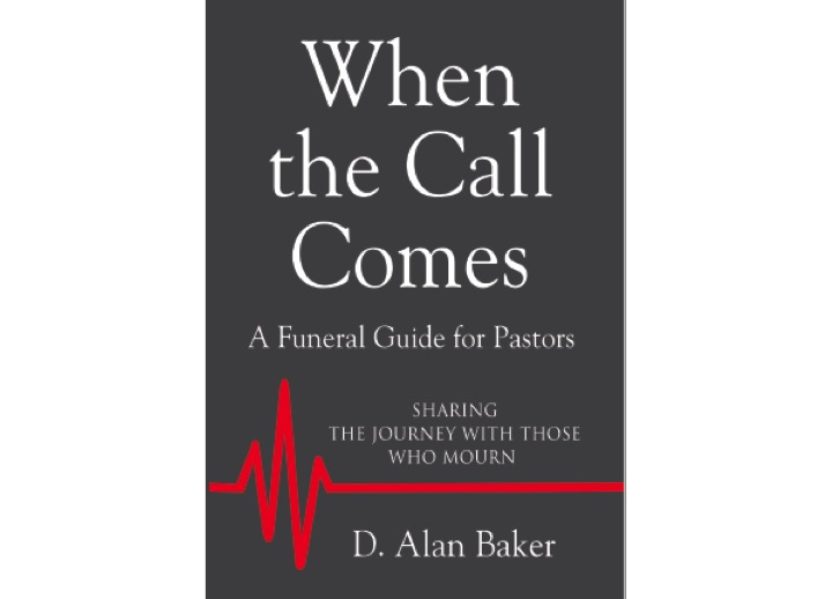When The Call Comes
Sharing the Journey With Those Who Mourn
Editor’s Note: Journey is pleased to announce that our new resource for pastors, “When the Call Comes: A Pastor’s Guide to Funerals” has just been released. This 232-page book (paper and ebook formats) helps ministers prepare themselves to walk with families in grief – from the moment the call comes informing the pastor that a death has occurred all the way through to the final “Amen” of the graveside service. This month’s Journey blog post is the Preface to the book.
It is hard to have patience with people who say, “There is no death” or “Death doesn’t matter.” There is death. And whatever is, matters. And whatever happens has consequences, and it and they are irrevocable and irreversible. You might as well say that birth doesn’t matter.
C.S. Lewis
The simple wooden casket was set on the far side of the plain and somewhat shabby room in northwest Indiana. Silence filled the space in an unearthly and uncomfortable way. I didn’t recognize the reason why at first, but then it dawned on me: the room was unearthly-silent because it was uncomfortably empty. In this room filled with dozens of empty chairs, there were just two people. And a casket. One open casket.
The two individuals, an elderly woman and her middle-aged son, were seated side by side in the row of chairs nearest to and facing the casket. The elderly woman clutched a handkerchief in one hand while her other was cradled in the hands of her son, seated to her left. In silence, they sat before the open casket of her husband, his father, waiting for the mourners they knew would come. The mourners who never came.
I silently approached this grieving widow and son. After quietly greeting them, I sat in the chair next to the son.
For two hours, I sat with them. For two hours, I prayed for them (and for me), ministered to them, and sat in silence with them. For two hours I grieved for them. Not just for their loss, but for them. In their pain, they had counted on the comfort of friends who would come to share their sorrow and pay their respects, but not one person came.
And so, they were not just lonely: they were alone. Their loss was made all the more unbearable by the absence of anyone to share their sorrow. The absence of others was palpable in the room, its weight crushing their hearts and mine.
As the scheduled time of visitation came to an end, I helped them with their coats and walked them to their car in the equally empty funeral home parking lot. I reassured them of my prayers on their behalf and God’s presence and comfort in their lives. I assured them of my commitment to do my very best for them and their departed husband and father in the funeral services of the next day. It was all I could do to hold myself together emotionally as we said our final goodbyes that evening.After their car had pulled away into the darkness of the night, I fought to hold back tears as I made my way to my own car. Seated behind the steering wheel, I fought no more, but gave way to my emotions, weeping for this family of two and the empty, aching pain that overwhelmed them.
Sitting alone in my car, I prayed. Helpless and hurting, I prayed. My prayer was a simple and heartfelt one: “Heavenly Father, break my heart. Break my heart for these two people. Let me mourn with them – not just for them, but with them as a member of the family so that as your servant, I might serve them as you would serve them.”
The next day, God answered my prayer. My wife and I preached, prayed, sang, comforted, and ministered as if there were only two people in the whole world. Because in the world of that room, that’s all there were. At the funeral home and the graveside, we mourned as members of the family, and we ministered as the heart and hands of God extended. In our own need of comfort, we comforted; in our own sorrow, we were able to extend God’s grace. All from hearts broken by the heart of the God in heaven whose heart first and most deeply broke for the one deceased and for the ones he had left behind.
You may wonder why I was so surprised at the lack of turnout for this funeral or why it was that my church did not come out to support this grieving mother and son. The answer lies in the fact that this family of two was not a part of the church where I served: I was just their pastor in their time of loss.
The senior pastor I served under at the time had opened to me the opportunity to officiate funerals for families without a home church. Grieving families would contact our church because of previous connections with us or on the recommendation of a local funeral director. Eager to serve in any way I could, I accepted as many of these requests as I could. These calls led to dozens of ministry opportunities as I walked with individuals and families in their grief, their losses of all kinds: the expected and the unexpected; the old, the young, even infants; the believers and the unbelievers. I spent many hours with mourning family members in hospitals and homes – at bedsides, in living rooms, and at kitchen tables – as they waited for the death of a loved one or after the fact, as they struggled to come to grips with the all too present and personal reality of death.
In the parking lot of that funeral home that night, behind the steering wheel of my car, I prayed a prayer for the first time that I have prayed many times since: “Father, break my heart for this family; let me mourn as a member of their family even as you enable me to minister as your heart and hands extended.” It is a prayer I continue to pray to this day. And it is a prayer God has never failed to answer. I thank Him for it.
Often, the grave buries two hearts.
José Luis Navajo
Editor’s Note: “When the Call Comes” helps pastors address the many ministry responsibilities – and privileges – associated with funeral ministry: meeting with the family for the first time; funeral service planning; the visitation; the funeral services; the graveside and more. Included are funeral resources designed to help the minister prepare. “When the Call Comes” (paperback version) is available here on the Journey website or at your favorite online retailer (paperback and ebook versions).
————————
NOTE: Journey Pastoral Coaching exists to provide pastoral coaching to Millennial ministers.
Saddled with large student debt, just beginning to set up homes and start families, and serving in low paying first and second positions, Millennials are those who most desire but can least afford to pay for pastoral coaching.
So we offer it to them at NO COST: Our members do not PAY for coaching; they EARN it by investing in each other.
We are able to do so thanks to the faithful and generous support of individuals and churches like yours who want to see young leaders not only enter the ministry, but remain in the ministry. If you or your church would like to help Millennial ministers in 20 US states and 5 nations build strong for a lifetime in ministry, please click here to contact us by email or to support Journey monthly or with your one-time gift. Thank you.
We also invite you to click and subscribe to our twice-monthly blogs at journeypastoralcoaching.com
“In the early years when I was becoming a pastor, I needed a pastor.”
Eugene H. Peterson, The Pastor: A Memoir



